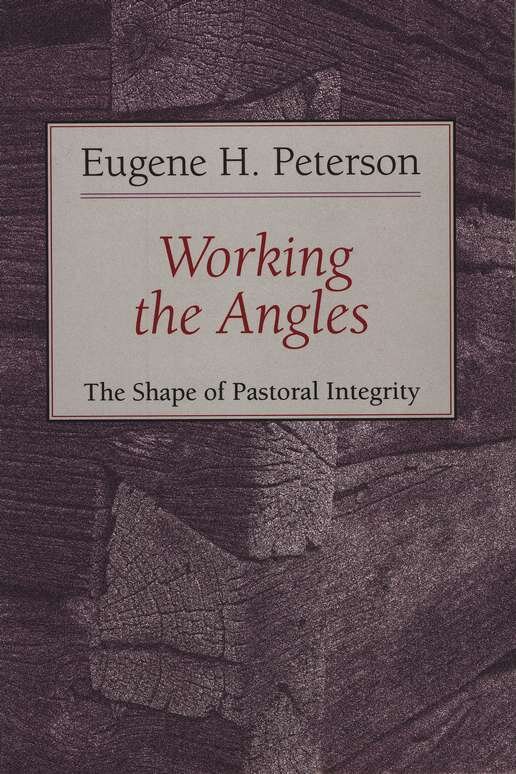Eugene Peterson, Working the Angles: The Shape of Pastoral Integrity. Eerdmans, 1987.
Referenced in: Pastoral Theology
LifeandLeadership.com Summary
This was the second of Eugene Peterson’s work on pastoral theology. It was preceded by Five Smooth Stones for Pastoral Work (1980), and followed by The Contemplative Pastor (1989), Under the Unpredictable Plant (1992), and Pastor: A Memoir (2011). This is probably the most widely quoted of all the volumes, and is a modern classic of pastoral theology. Eugene Peterson breathes deep, reflective insight into his writings.
Peterson’s opening words set the tone for the book. He begins with a lament:
“The pastors of America have metamorphosed into a company of shopkeepers, and the shops they keep are churches. They are preoccupied with shopkeeper’s concerns – how to keep customers happy, how to lure customers away from competitors down the street, how to package the goods so that the customers will lay out more money. …[But] the biblical fact is there are no successful churches. There are, instead, communities of sinners, gathered before God week after week in towns and villages all over the world. The Holy Spirit gathers them and does his work in them. In these communities of sinners, one of the sinners is called pastor and given a designated responsibility to keep the community attentive to God. It is this responsibility that is being abandoned in spades.” (2)
He wonders:
“And there must be any number of shopkeepers who by now are finding the pottage that they acquired in exchange for their ordination birthright pretty tasteless stuff and are growing wistful for a restoration to their calling. Is the wistfulness and ember strong enough to blaze into a fierce repudiation of their defection, allowing the word of God again to become the first in their mouths?” (3)
As a necessary corrective and refocusing of ministry, he calls ministers back to three acts: praying, reading Scripture, and giving spiritual direction. He insists that these three acts are quiet, do not call attention to themselves, and do not factor into pastoral evaluations, and are thus widely neglected.
In defining these three acts, he says:
“Prayer is an act in which I bring myself to attention before God; reading Scripture is an act of attending to God in his speech and action across two millennia in Israel and Christ; spiritual direction is an act of giving attention to what God is doing in the person who happens to be before me at any given moment.
Always it is God to whom we are paying, or trying to pay attention. The contexts, though, vary: in prayer the context is myself; in Scripture it is the community of faith in history; in spiritual direction it is the person before me. God is the one to whom we are being primarily attentive in these contexts, but it is never God-in-himself; rather, it is God-in-relationship – with me, with his people, with his person.” (4)
He says none of this is public, although people hear us pray and read Scripture, and can tell whether we are listening to them, “they can never know if we are attending to God in any of this.” In fact, “it doesn’t take many years in this business to realize that we can conduct a fairly respectable pastoral ministry without giving much more than ceremonial attention to God.” (4)
From this point, and throughout, he develops these three acts into what is still one of the most convicting and centering treatises on the pastoral role. The title “Working the Angles,” means that these three practices constitute his trigonometry of ministry. They are the angles of the triangle. As long as they are sharp, no matter how long/short and disproportionate the connecting lines may be as the occasions demand, we still have a faithful ministry.
This is one of those books that should be read by all ministers. It is foundational.
From the Publisher
With characteristic insight and wit Peterson reminds us that the success of our ministry does not rest on either cutting edge methodology or the ability to administer programs, but on our ability to listen. Thus, he encourages us to return to the regular practice of listening to God in prayer, listening to the revelation of Scripture and listening to the stories of our neighbors. Working the Angles does not reveal an unknown secret of pastoral ministry, but encourages us to return to a basic practice and rhythm of pastoral life.
About the Author
Eugene H. Peterson is a pastor, scholar, writer, and poet. After teaching at a seminary and then giving nearly 30 years to church ministry in the Baltimore area, he created The Message – a vibrant Bible paraphrase that connects with today’s readers like no other.
***For additional information on this resource, including reviews, click the bookstore links. Check the reference at page top or the links below for resource guides on related topics.***
See Other Resource Guides on Pastoral Theology:
- Minister Self-Care
- Ministry Burnout, Prevening and Overcoming
- Ministry Ethics
- Ministry Support Systems
- Strengthening and Renewing the Ministry Call
- Theology of Mission and Ministry
See Resources on Over 100 Ministry Topics:


